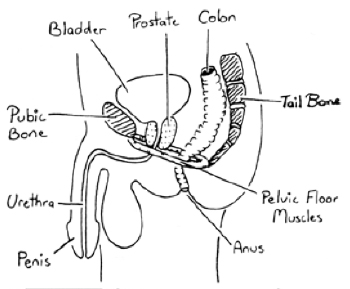
Men Have a Pelvic Floor Too
The pelvic floor muscles have typically been seen as ‘women’s business’, but did you know that men have a pelvic floor too? When a man’s pelvic floor is not working properly, it can lead to bladder problems, bowel problems, erectile dysfunction, or pain in the genitals and pelvis. Many of these problems can be improved, and often cured, by seeing a pelvic floor physiotherapist.
How Do The Pelvic Floor Muscles Work In Men?
The pelvic floor muscles are a muscular sling at the base of the pelvis, attaching to the pubic bone at the front and the tail bone at the back. They sit below the bladder and bowel, and contract and relax to help open and close the urethra and rectum to control the bladder and bowel. During an erection, the pelvic floor muscles contract to trap blood in the penis to maintain firmness, and also help with ejaculation.
What Can Go Wrong With A Man’s Pelvic Floor?
A man’s pelvic floor can either be too weak, or too tense.
A weak pelvic floor is often caused by years of heavy lifting, constipation and straining when going to the toilet, having a chronic cough, being overweight or inactive, or ageing.
A tense, or ‘overactive’ pelvic floor, is less well known, but something we see very commonly at Women’s & Men’s Health Physiotherapy. A tense pelvic floor can be caused by stress or anxiety, doing too much core exercise, poor core stability, too much sitting or bike riding, or following pain, trauma, or surgery in the pelvic region, such as having a vasectomy.
What Problems Can Occur When The Pelvic Floor Muscles Aren’t Working Properly?
When your pelvic floor muscles aren’t working properly, the following problems can occur:
- Bladder Problems; accidental leakage, needing to rush to the toilet, going too often, waking frequently at night to urinate, difficulty with the flow of urine, or dribbling after going to the toilet. To learn more about bladder problems, click here.
- Bowel Problems; accidental leakage, having to strain to empty your bowels, needing to rush to the toilet, and accidentally passing wind. To learn more about bowel problems, click here.
- Chronic Pelvic & Sexual Pain; pain in the anus, testes, or penis, pain with sitting, and pain with ejaculation, erection or orgasm. To learn more about chronic pelvic pain, click here.
- Erectile Dysfunction; reduced firmness of erection, erections that fade quickly, and premature ejaculation. To learn more about erectile dysfunction, click here.
How Do You Know If Your Pelvic Floor Isn’t Working Properly?
The only way to know how well your pelvic floor muscles are working is by having a pelvic floor examination with a specifically trained Pelvic Floor Physio. They will either do a digital rectal examination or an ultrasound on the perineum (the area between your scrotum and anus) to examine your pelvic floor muscles and assess how well they are working.
What Can Be Done To Help?
If your pelvic floor muscles are found to be too weak or too tense, a specifically tailored pelvic floor muscle exercise program would be recommended. For the exercises to work – you need 3 key factors:
- Individualisation: the program needs to be individualised to YOUR muscle’s needs, and any problems you are experiencing
- Progression: the exercises need to be progressed regularly
- Adherence: you need to do them regularly!!
Strengthening or relaxing a muscle takes time and commitment. For the pelvic floor muscles, it generally takes 3-6 months.
Don’t Suffer In Silence
Men with problems in the pelvis don’t need to suffer in silence any longer. If you are having bladder problems, bowel problems, erectile dysfunction or pain in the pelvis, see your GP for a check-up, and see a Pelvic Floor Physio to get started on a tailored pelvic health rehabilitation program.
June 2019





